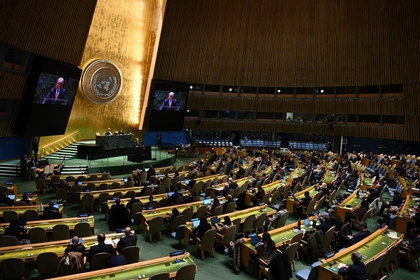The FATF meets next week, October 22, and is expected to debate again Russia’s FATF blacklisting. It is absolutely remarkable that Russia is not already on the FATF blacklist with its buddies North Korea and Iran. It is just incredible that Western countries have not made this happen already as Russia is clearly a state sponsor of terrorism – ask the head of Germany’s biggest arms maker whom Russia planned to kill, or the UK and German postal services who countered Russian bomb plots, or indeed the head of UK MI5 and it’s German equivalent who over recent weeks have identified the broader terrorist threat from Russia.
Russia continues to break sanctions, and encourages others to do so – see the FT, and others reporting around shadow fleets.
It would be an appropriate parting blow from the Biden administration to finally get Russia FATF blacklisted. And if we end up with a Trump presidency, removal of Russia from the FATF blacklist would provide a point of leverage over Russia in any future peace talks on Ukraine.
Notable I think in recent months that pressures around Russia’s economy have been increasing as reflected in the rouble heading back to 100, inflation heading higher and the CBR having to hike policy rates in defense of the rouble and to counter inflation.
Some of this reflects recent additional sanctions measures taken, including sanctioning the Russian exchange, MOEX, plus also tightening of secondary sanctions, making it more difficult for third parties, like China and India, to trade with Russia.

US Urges Backing of ‘Simple’ UN Resolution as Trump Calls for Putin-Zelensky Talks
Tighter sanctions on Russia are important for a number of reasons:
First, they help weaken the Russian economy, making it harder and more expensive for Russia to regenerate its military machine to wage war on Ukraine.
Second, sanctions were initially imposed on Russia because of its invasion of Ukraine and in support therein of Ukraine (point one) but as events have unfolded it is now clear that Russia is a malign actor against Western interests globally, and Putin thinks he is at war with the West and NATO.
So it is now in NATO’s interests to weaken Russia, and reduce its war-making capability which might be used against us in the future. Threat perceptions have moved on. It is no longer just about Ukraine, but the wider threat from Russia to the West. Sanctions help degrade that threat.
Third, sanctions weaken and hurt the Russian economy and thereby give Ukraine and the West leverage in any future negotiations with Russia. For this reason, FATF blacklisting of Russia makes absolute sense for the West.
Interesting in all this that FATF was created initially to counter the threat from Islamist terrorism post 911. One argument for not blacklisting
Russia is still an important player in countering these same radical Islamist terrorists. However, as events have now unfolded, and as the threat from those same Islamist terrorist organizations have been countered and moderated, arguably Russia now has emerged as the bigger terrorist threat to the West.
And its alliances with Iran and North Korea – which is now supplying 10,000 troops to fight in Russia’s war in Ukraine, are part of this same axis of evil. How better to signal to Russia that it should not be allying with Iran and North Korea to attack Western interests in Ukraine, and globally than by putting Russia on the FATF blacklist.
Message to Russia – you are allying now with other FATF-blacklisted states in your war in Ukraine, by using drones, munitions and men from these states, and as a result, we are FATF blacklisting you.
Now one counterargument might be that if we FATF-blacklist Russia it will be less cooperative in the fight against extreme Islamist terrorist entities which drove the initial foundation of the FATF.
I would argue that that’s unlikely, as Russia itself now faces an even greater threat from these same radical Islamist terrorist organizations as seen by recent attacks in Russia, including the Moscow theater attack over the past year. It is still in Russia’s interests to work to counter these same threats, and FATF blacklisting is unlikely to change Russia’s interests therein.
Reprinted from the author’s @tashecon blog! See the original here.
The views expressed in this opinion article are the author’s and not necessarily those of Kyiv Post.
You can also highlight the text and press Ctrl + Enter











